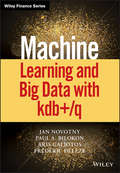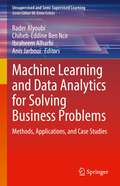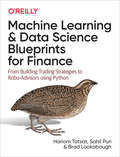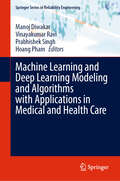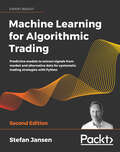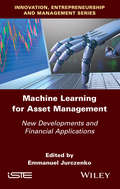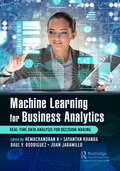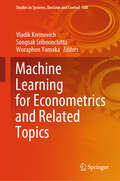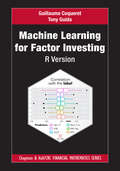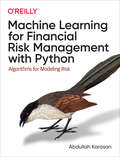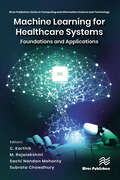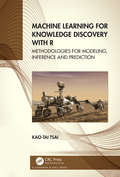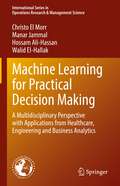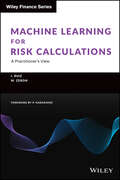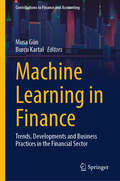- Table View
- List View
Machine Learning Techniques for Smart City Applications: Trends and Solutions (Advances in Science, Technology & Innovation)
by D. Jude HemanthThis book discusses the application of different machine learning techniques to the sub-concepts of smart cities such as smart energy, transportation, waste management, health, infrastructure, etc. The focus of this book is to come up with innovative solutions in the above-mentioned issues with the purpose of alleviating the pressing needs of human society. This book includes content with practical examples which are easy to understand for readers. It also covers a multi-disciplinary field and, consequently, it benefits a wide readership including academics, researchers, and practitioners.
Machine Learning Technologies on Energy Economics and Finance: Energy and Sustainable Analytics, Volume 1 (International Series in Operations Research & Management Science #367)
by Mohammad Zoynul Abedin Wang YongThis book explores the latest innovations in energy economics and finance, with a particular focus on the role of machine learning algorithms in advancing the energy sector. It examines key factors shaping this field, including market structures, regulatory frameworks, environmental impacts, and the dynamics of the global energy market. It discusses the critical application of machine learning (ML) in energy financing, introducing predictive tools for forecasting energy prices across various sectors—such as crude oil, electricity, fuelwood, solar, and natural gas. It also addresses how ML can predict investor behavior and assess the efficiency of energy markets, with a focus on both the opportunities and challenges in renewable energy and energy finance. This book serves as a comprehensive guide for academics, practitioners, financial managers, stakeholders, government officials, and policymakers who seek strategies to enhance energy systems, reduce costs and uncertainties, and optimize revenue for economic growth. This is the first volume of a two-volume set.
Machine Learning Technologies on Energy Economics and Finance: Energy and Sustainable Analytics, Volume 2 (International Series in Operations Research & Management Science #368)
by Mohammad Zoynul Abedin Wang YongThis book explores the latest innovations in energy economics and finance, with a particular focus on the role of machine learning algorithms in advancing the energy sector. It examines key factors shaping this field, including market structures, regulatory frameworks, environmental impacts, and the dynamics of the global energy market. It discusses the critical application of machine learning (ML) in energy financing, introducing predictive tools for forecasting energy prices across various sectors—such as crude oil, electricity, fuelwood, solar, and natural gas. It also addresses how ML can predict investor behavior and assess the efficiency of energy markets, with a focus on both the opportunities and challenges in renewable energy and energy finance. This book serves as a comprehensive guide for academics, practitioners, financial managers, stakeholders, government officials, and policymakers who seek strategies to enhance energy systems, reduce costs and uncertainties, and optimize revenue for economic growth. This is the second volume of a two-volume set.
Machine Learning and Artificial Intelligence
by Ameet V JoshiThis book provides comprehensive coverage of combined Artificial Intelligence (AI) and Machine Learning (ML) theory and applications. Rather than looking at the field from only a theoretical or only a practical perspective, this book unifies both perspectives to give holistic understanding. The first part introduces the concepts of AI and ML and their origin and current state. The second and third parts delve into conceptual and theoretic aspects of static and dynamic ML techniques. The forth part describes the practical applications where presented techniques can be applied. The fifth part introduces the user to some of the implementation strategies for solving real life ML problems. The book is appropriate for students in graduate and upper undergraduate courses in addition to researchers and professionals. It makes minimal use of mathematics to make the topics more intuitive and accessible.Presents a full reference to artificial intelligence and machine learning techniques - in theory and application;Provides a guide to AI and ML with minimal use of mathematics to make the topics more intuitive and accessible;Connects all ML and AI techniques to applications and introduces implementations.
Machine Learning and Artificial Intelligence for Agricultural Economics: Prognostic Data Analytics to Serve Small Scale Farmers Worldwide (International Series in Operations Research & Management Science #314)
by Chandrasekar VuppalapatiThis book discusses machine learning and artificial intelligence (AI) for agricultural economics. It is written with a view towards bringing the benefits of advanced analytics and prognostics capabilities to small scale farmers worldwide. This volume provides data science and software engineering teams with the skills and tools to fully utilize economic models to develop the software capabilities necessary for creating lifesaving applications. The book introduces essential agricultural economic concepts from the perspective of full-scale software development with the emphasis on creating niche blue ocean products. Chapters detail several agricultural economic and AI reference architectures with a focus on data integration, algorithm development, regression, prognostics model development and mathematical optimization. Upgrading traditional AI software development paradigms to function in dynamic agricultural and economic markets, this volume will be of great use to researchers and students in agricultural economics, data science, engineering, and machine learning as well as engineers and industry professionals in the public and private sectors.
Machine Learning and Big Data with kdb+/q (Wiley Finance)
by Jan Novotny Paul A. Bilokon Aris Galiotos Frederic DelezeUpgrade your programming language to more effectively handle high-frequency data Machine Learning and Big Data with KDB+/Q offers quants, programmers and algorithmic traders a practical entry into the powerful but non-intuitive kdb+ database and q programming language. Ideally designed to handle the speed and volume of high-frequency financial data at sell- and buy-side institutions, these tools have become the de facto standard; this book provides the foundational knowledge practitioners need to work effectively with this rapidly-evolving approach to analytical trading. The discussion follows the natural progression of working strategy development to allow hands-on learning in a familiar sphere, illustrating the contrast of efficiency and capability between the q language and other programming approaches. Rather than an all-encompassing “bible”-type reference, this book is designed with a focus on real-world practicality to help you quickly get up to speed and become productive with the language. Understand why kdb+/q is the ideal solution for high-frequency data Delve into “meat” of q programming to solve practical economic problems Perform everyday operations including basic regressions, cointegration, volatility estimation, modelling and more Learn advanced techniques from market impact and microstructure analyses to machine learning techniques including neural networks The kdb+ database and its underlying programming language q offer unprecedented speed and capability. As trading algorithms and financial models grow ever more complex against the markets they seek to predict, they encompass an ever-larger swath of data – more variables, more metrics, more responsiveness and altogether more “moving parts.” Traditional programming languages are increasingly failing to accommodate the growing speed and volume of data, and lack the necessary flexibility that cutting-edge financial modelling demands. Machine Learning and Big Data with KDB+/Q opens up the technology and flattens the learning curve to help you quickly adopt a more effective set of tools.
Machine Learning and Data Analytics for Solving Business Problems: Methods, Applications, and Case Studies (Unsupervised and Semi-Supervised Learning)
by Bader Alyoubi Chiheb-Eddine Ben Ncir Ibraheem Alharbi Anis JarbouiThis book presents advances in business computing and data analytics by discussing recent and innovative machine learning methods that have been designed to support decision-making processes. These methods form the theoretical foundations of intelligent management systems, which allows for companies to understand the market environment, to improve the analysis of customer needs, to propose creative personalization of contents, and to design more effective business strategies, products, and services. This book gives an overview of recent methods – such as blockchain, big data, artificial intelligence, and cloud computing – so readers can rapidly explore them and their applications to solve common business challenges. The book aims to empower readers to leverage and develop creative supervised and unsupervised methods to solve business decision-making problems.
Machine Learning and Data Mining for Emerging Trend in Cyber Dynamics: Theories and Applications
by Philippe Fournier-Viger Nuno M. Garcia Haruna Chiroma Shafi’i M. AbdulhamidThis book addresses theories and empirical procedures for the application of machine learning and data mining to solve problems in cyber dynamics. It explains the fundamentals of cyber dynamics, and presents how these resilient algorithms, strategies, techniques can be used for the development of the cyberspace environment such as: cloud computing services;cyber security; data analytics; and,disruptive technologies like blockchain. The book presents new machine learning and data mining approaches in solving problems in cyber dynamics. Basic concepts, related work reviews, illustrations, empirical results and tables are integrated in each chapter to enable the reader to fully understand the concepts, methodology, and the results presented. The book contains empirical solutions of problems in cyber dynamics ready for industrial applications. The book will be an excellent starting point for postgraduate students and researchers because each chapter is design to have future research directions.
Machine Learning and Data Science Blueprints for Finance: From Building Trading Strategies To Robo-advisors Using Python
by Hariom Tatsat Sahil Puri Brad LookabaughOver the next few decades, machine learning and data science will transform the finance industry. With this practical book, analysts, traders, researchers, and developers will learn how to build machine learning algorithms crucial to the industry. You'll examine ML concepts and over 20 case studies in supervised, unsupervised, and reinforcement learning, along with natural language processing (NLP).Ideal for professionals working at hedge funds, investment and retail banks, and fintech firms, this book also delves deep into portfolio management, algorithmic trading, derivative pricing, fraud detection, asset price prediction, sentiment analysis, and chatbot development. You'll explore real-life problems faced by practitioners and learn scientifically sound solutions supported by code and examples.This book covers:Supervised learning regression-based models for trading strategies, derivative pricing, and portfolio managementSupervised learning classification-based models for credit default risk prediction, fraud detection, and trading strategiesDimensionality reduction techniques with case studies in portfolio management, trading strategy, and yield curve constructionAlgorithms and clustering techniques for finding similar objects, with case studies in trading strategies and portfolio managementReinforcement learning models and techniques used for building trading strategies, derivatives hedging, and portfolio managementNLP techniques using Python libraries such as NLTK and scikit-learn for transforming text into meaningful representations
Machine Learning and Deep Learning Modeling and Algorithms with Applications in Medical and Health Care (Springer Series in Reliability Engineering)
by Hoang Pham Vinayakumar Ravi Prabhishek Singh Manoj DiwakarThis book explains medical image processing and analysis using deep learning algorithms to analyze medical data. It focuses on the latest achievements and developments in applying this analysis to medical imaging, clinical, and other healthcare applications. The book covers among other areas: Image acquisition and formation. Computer-aided diagnosis. Image classification. Feature extraction. Image enhancement/segmentation. Medical image processing issues such as segmentation, visualization, registration, and navigation may seem to be distinct, yet they are all intertwined in the process of resolving clinical bottlenecks. Using deep learning algorithms, researchers were able to achieve record-breaking performance and set the bar for future research. Due to the extensive quantity of medical imaging data of CT scan, ultrasound, and MRI, there is widespread use of machine learning, specifically deep learning, to discover specific patterns on such data. Such large data is well quantified by deep learning models. Deep learning is now being utilized, customized, and particularly developed for medical image analysis, as opposed to when it was first introduced to the community. Having learned more about the techniques, researchers have come up with innovative ideas for combining artificial intelligence (AI) with neural networks to solve difficult issues like medical image reconstruction. The key features of this book are: Machine learning and deep learning applications. Medical imaging applications. Feature extraction and analysis. Medical image classification, segmentation, recognition, and registration. Medical image analysis and enhancement. Handling medical image dataset.
Machine Learning for Algorithmic Trading: Predictive models to extract signals from market and alternative data for systematic trading strategies with Python, 2nd Edition
by Stefan JansenLeverage machine learning to design and back-test automated trading strategies for real-world markets using pandas, TA-Lib, scikit-learn, LightGBM, SpaCy, Gensim, TensorFlow 2, Zipline, backtrader, Alphalens, and pyfolio.Purchase of the print or Kindle book includes a free eBook in the PDF format.Key FeaturesDesign, train, and evaluate machine learning algorithms that underpin automated trading strategiesCreate a research and strategy development process to apply predictive modeling to trading decisionsLeverage NLP and deep learning to extract tradeable signals from market and alternative dataBook DescriptionThe explosive growth of digital data has boosted the demand for expertise in trading strategies that use machine learning (ML). This revised and expanded second edition enables you to build and evaluate sophisticated supervised, unsupervised, and reinforcement learning models.This book introduces end-to-end machine learning for the trading workflow, from the idea and feature engineering to model optimization, strategy design, and backtesting. It illustrates this by using examples ranging from linear models and tree-based ensembles to deep-learning techniques from cutting edge research.This edition shows how to work with market, fundamental, and alternative data, such as tick data, minute and daily bars, SEC filings, earnings call transcripts, financial news, or satellite images to generate tradeable signals. It illustrates how to engineer financial features or alpha factors that enable an ML model to predict returns from price data for US and international stocks and ETFs. It also shows how to assess the signal content of new features using Alphalens and SHAP values and includes a new appendix with over one hundred alpha factor examples.By the end, you will be proficient in translating ML model predictions into a trading strategy that operates at daily or intraday horizons, and in evaluating its performance.What you will learnLeverage market, fundamental, and alternative text and image dataResearch and evaluate alpha factors using statistics, Alphalens, and SHAP valuesImplement machine learning techniques to solve investment and trading problemsBacktest and evaluate trading strategies based on machine learning using Zipline and BacktraderOptimize portfolio risk and performance analysis using pandas, NumPy, and pyfolioCreate a pairs trading strategy based on cointegration for US equities and ETFsTrain a gradient boosting model to predict intraday returns using AlgoSeek's high-quality trades and quotes dataWho this book is forIf you are a data analyst, data scientist, Python developer, investment analyst, or portfolio manager interested in getting hands-on machine learning knowledge for trading, this book is for you. This book is for you if you want to learn how to extract value from a diverse set of data sources using machine learning to design your own systematic trading strategies.Some understanding of Python and machine learning techniques is required.
Machine Learning for Asset Management: New Developments and Financial Applications
by Emmanuel JurczenkoThis new edited volume consists of a collection of original articles written by leading financial economists and industry experts in the area of machine learning for asset management. The chapters introduce the reader to some of the latest research developments in the area of equity, multi-asset and factor investing. Each chapter deals with new methods for return and risk forecasting, stock selection, portfolio construction, performance attribution and transaction costs modeling. This volume will be of great help to portfolio managers, asset owners and consultants, as well as academics and students who want to improve their knowledge of machine learning in asset management.
Machine Learning for Business Analytics: Real-Time Data Analysis for Decision-Making
by Hemachandran K. Sayantan Khanra Raul V. Rodriguez Juan R. JaramilloMachine Learning is an integral tool in a business analyst’s arsenal because the rate at which data is being generated from different sources is increasing and working on complex unstructured data is becoming inevitable. Data collection, data cleaning, and data mining are rapidly becoming more difficult to analyze than just importing information from a primary or secondary source. The machine learning model plays a crucial role in predicting the future performance and results of a company. In real-time, data collection and data wrangling are the important steps in deploying the models. Analytics is a tool for visualizing and steering data and statistics. Business analysts can work with different datasets -- choosing an appropriate machine learning model results in accurate analyzing, forecasting the future, and making informed decisions. The global machine learning market was valued at $1.58 billion in 2017 and is expected to reach $20.83 billion in 2024 -- growing at a CAGR of 44.06% between 2017 and 2024. The authors have compiled important knowledge on machine learning real-time applications in business analytics. This book enables readers to get broad knowledge in the field of machine learning models and to carry out their future research work. The future trends of machine learning for business analytics are explained with real case studies. Essentially, this book acts as a guide to all business analysts. The authors blend the basics of data analytics and machine learning and extend its application to business analytics. This book acts as a superb introduction and covers the applications and implications of machine learning. The authors provide first-hand experience of the applications of machine learning for business analytics in the section on real-time analysis. Case studies put the theory into practice so that you may receive hands-on experience with machine learning and data analytics. This book is a valuable source for practitioners, industrialists, technologists, and researchers.
Machine Learning for Business Analytics: Real-Time Data Analysis for Decision-Making
by Hemachandran K. Sayantan Khanra Raul V. Rodriguez Juan R. JaramilloMachine Learning is an integral tool in a business analyst’s arsenal because the rate at which data is being generated from different sources is increasing and working on complex unstructured data is becoming inevitable. Data collection, data cleaning, and data mining are rapidly becoming more difficult to analyze than just importing information from a primary or secondary source. The machine learning model plays a crucial role in predicting the future performance and results of a company. In real-time, data collection and data wrangling are the important steps in deploying the models. Analytics is a tool for visualizing and steering data and statistics. Business analysts can work with different datasets -- choosing an appropriate machine learning model results in accurate analyzing, forecasting the future, and making informed decisions. The global machine learning market was valued at $1.58 billion in 2017 and is expected to reach $20.83 billion in 2024 -- growing at a CAGR of 44.06% between 2017 and 2024. The authors have compiled important knowledge on machine learning real-time applications in business analytics. This book enables readers to get broad knowledge in the field of machine learning models and to carry out their future research work. The future trends of machine learning for business analytics are explained with real case studies. Essentially, this book acts as a guide to all business analysts. The authors blend the basics of data analytics and machine learning and extend its application to business analytics. This book acts as a superb introduction and covers the applications and implications of machine learning. The authors provide first-hand experience of the applications of machine learning for business analytics in the section on real-time analysis. Case studies put the theory into practice so that you may receive hands-on experience with machine learning and data analytics. This book is a valuable source for practitioners, industrialists, technologists, and researchers.
Machine Learning for Econometrics and Related Topics (Studies in Systems, Decision and Control #508)
by Vladik Kreinovich Songsak Sriboonchitta Woraphon YamakaIn the last decades, machine learning techniques – especially techniques of deep learning – led to numerous successes in many application areas, including economics. The use of machine learning in economics is the main focus of this book; however, the book also describes the use of more traditional econometric techniques. Applications include practically all major sectors of economics: agriculture, health (including the impact of Covid-19), manufacturing, trade, transportation, etc. Several papers analyze the effect of age, education, and gender on economy – and, more generally, issues of fairness and discrimination.We hope that this volume will:help practitioners to become better knowledgeable of the state-of-the-art econometric techniques, especially techniques of machine learning,and help researchers to further develop these important research directions. We want to thank all the authors for their contributions and all anonymous referees for their thorough analysis and helpful comments.
Machine Learning for Factor Investing: R Version (Chapman and Hall/CRC Financial Mathematics Series)
by Tony Guida Guillaume CoqueretMachine learning (ML) is progressively reshaping the fields of quantitative finance and algorithmic trading. ML tools are increasingly adopted by hedge funds and asset managers, notably for alpha signal generation and stocks selection. The technicality of the subject can make it hard for non-specialists to join the bandwagon, as the jargon and coding requirements may seem out of reach. Machine Learning for Factor Investing: R Version bridges this gap. It provides a comprehensive tour of modern ML-based investment strategies that rely on firm characteristics. The book covers a wide array of subjects which range from economic rationales to rigorous portfolio back-testing and encompass both data processing and model interpretability. Common supervised learning algorithms such as tree models and neural networks are explained in the context of style investing and the reader can also dig into more complex techniques like autoencoder asset returns, Bayesian additive trees, and causal models. All topics are illustrated with self-contained R code samples and snippets that are applied to a large public dataset that contains over 90 predictors. The material, along with the content of the book, is available online so that readers can reproduce and enhance the examples at their convenience. If you have even a basic knowledge of quantitative finance, this combination of theoretical concepts and practical illustrations will help you learn quickly and deepen your financial and technical expertise.
Machine Learning for Finance: The practical guide to using data-driven algorithms in banking, insurance, and investments
by Jannes KlaasPlan and build useful machine learning systems for financial services, with full working Python codeKey FeaturesBuild machine learning systems that will be useful across the financial services industryDiscover how machine learning can solve finance industry challengesGain the machine learning insights and skills fintech companies value mostBook DescriptionMachine learning skills are essential for anybody working in financial data analysis. Machine Learning for Finance shows you how to build machine learning models for use in financial services organizations. It shows you how to work with all the key machine learning models, from simple regression to advanced neural networks.You will see how to use machine learning to automate manual tasks, identify and address systemic bias, and find new insights and patterns hidden in available data. Machine Learning for Finance encourages and equips you to find new ways to use data to serve an organization’s business goals.Broad in scope yet deeply practical in approach, Machine Learning for Finance will help you to apply machine learning in all parts of a financial organization’s infrastructure. If you work or plan to work in fintech, and want to gain one of the most valuable skills in the sector today, this book is for you.What you will learnPractical machine learning for the finance sectorBuild machine learning systems that support the goals of financial organizationsThink creatively about problems and how machine learning can solve themIdentify and reduce sources of bias from machine learning modelsApply machine learning to structured data, natural language, photographs, and written text related to financeUse machine learning to detect fraud, forecast financial trends, analyze customer sentiments, and moreImplement heuristic baselines, time series, generative models, and reinforcement learning in Python, scikit-learn, Keras, and TensorFlowWho this book is forMachine Learning for Finance is for financial professionals who want to develop and apply machine learning skills, and for students entering the field. You should be comfortable with Python and the basic data science stack, such as NumPy, pandas, and Matplotlib, to get the most out of this book.
Machine Learning for Financial Risk Management with Python: Algorithms for Modeling Risk
by Abdullah KarasanFinancial risk management is quickly evolving with the help of artificial intelligence. With this practical book, developers, programmers, engineers, financial analysts, risk analysts, and quantitative and algorithmic analysts will examine Python-based machine learning and deep learning models for assessing financial risk. Building hands-on AI-based financial modeling skills, you'll learn how to replace traditional financial risk models with ML models.Author Abdullah Karasan helps you explore the theory behind financial risk modeling before diving into practical ways of employing ML models in modeling financial risk using Python. With this book, you will:Review classical time series applications and compare them with deep learning modelsExplore volatility modeling to measure degrees of risk, using support vector regression, neural networks, and deep learningImprove market risk models (VaR and ES) using ML techniques and including liquidity dimensionDevelop a credit risk analysis using clustering and Bayesian approachesCapture different aspects of liquidity risk with a Gaussian mixture model and Copula modelUse machine learning models for fraud detectionPredict stock price crash and identify its determinants using machine learning models
Machine Learning for Healthcare Systems: Foundations and Applications (River Publishers Series in Computing and Information Science and Technology)
by Sachi Nandan Mohanty M. Rajalakshmi Subrata Chowdhury C. KarthikThe introduction of digital technology in the healthcare industry is marked by ongoing difficulties with implementation and use. Slow progress has been made in unifying different healthcare systems, and much of the world still lacks a fully integrated healthcare system. The intrinsic complexity and development of human biology, as well as the differences across patients, have repeatedly demonstrated the significance of the human element in the diagnosis and treatment of illnesses. But as digital technology develops, healthcare providers will undoubtedly need to use it more and more to give patients the best treatment possible. The extensive use of machine learning in numerous industries, including healthcare, has been made possible by advancements in data technologies, including storage capacity, processing capability, and data transit speeds. The need for a personalized medicine or "precision medicine" approach to healthcare has been highlighted by current trends in medicine due to the complexity of providing effective healthcare to each individual. Personalized medicine aims to identify, forecast, and analyze diagnostic decisions using vast volumes of healthcare data so that doctors may then apply them to each unique patient. These data may include, but are not limited to, information on a person’s genes or family history, medical imaging data, drug combinations, patient health outcomes at the community level, and natural language processing of pre-existing medical documentation. This book provides various insights into machine learning techniques in healthcare system data and its analysis. Recent technological advancements in the healthcare system represent cutting-edge innovations and global research successes in performance modelling, analysis, and applications.
Machine Learning for Knowledge Discovery with R: Methodologies for Modeling, Inference and Prediction
by Kao-Tai TsaiMachine Learning for Knowledge Discovery with R contains methodologies and examples for statistical modelling, inference, and prediction of data analysis. It includes many recent supervised and unsupervised machine learning methodologies such as recursive partitioning modelling, regularized regression, support vector machine, neural network, clustering, and causal-effect inference. Additionally, it emphasizes statistical thinking of data analysis, use of statistical graphs for data structure exploration, and result presentations. The book includes many real-world data examples from life-science, finance, etc. to illustrate the applications of the methods described therein. Key Features: Contains statistical theory for the most recent supervised and unsupervised machine learning methodologies. Emphasizes broad statistical thinking, judgment, graphical methods, and collaboration with subject-matter-experts in analysis, interpretation, and presentations. Written by statistical data analysis practitioner for practitioners. The book is suitable for upper-level-undergraduate or graduate-level data analysis course. It also serves as a useful desk-reference for data analysts in scientific research or industrial applications.
Machine Learning for Managers
by Paul GeertsemaMachine learning can help managers make better predictions, automate complex tasks and improve business operations. Managers who are familiar with machine learning are better placed to navigate the increasingly digital world we live in. There is a view that machine learning is a highly technical subject that can only be understood by specialists. However, many of the ideas that underpin machine learning are straightforward and accessible to anyone with a bit of curiosity. This book is for managers who want to understand what machine learning is about, but who lack a technical background in computer science, statistics or math. The book describes in plain language what machine learning is and how it works. In addition, it explains how to manage machine learning projects within an organization. This book should appeal to anyone that wants to learn more about using machine learning to drive value in real-world organizations.
Machine Learning for Practical Decision Making: A Multidisciplinary Perspective with Applications from Healthcare, Engineering and Business Analytics (International Series in Operations Research & Management Science #334)
by Hossam Ali-Hassan Christo El Morr Manar Jammal Walid EI-HallakThis book provides a hands-on introduction to Machine Learning (ML) from a multidisciplinary perspective that does not require a background in data science or computer science. It explains ML using simple language and a straightforward approach guided by real-world examples in areas such as health informatics, information technology, and business analytics. The book will help readers understand the various key algorithms, major software tools, and their applications. Moreover, through examples from the healthcare and business analytics fields, it demonstrates how and when ML can help them make better decisions in their disciplines. The book is chiefly intended for undergraduate and graduate students who are taking an introductory course in machine learning. It will also benefit data analysts and anyone interested in learning ML approaches.
Machine Learning for Risk Calculations: A Practitioner's View (The Wiley Finance Series)
by Ignacio Ruiz Mariano ZeronState-of-the-art algorithmic deep learning and tensoring techniques for financial institutions The computational demand of risk calculations in financial institutions has ballooned and shows no sign of stopping. It is no longer viable to simply add more computing power to deal with this increased demand. The solution? Algorithmic solutions based on deep learning and Chebyshev tensors represent a practical way to reduce costs while simultaneously increasing risk calculation capabilities. Machine Learning for Risk Calculations: A Practitioner’s View provides an in-depth review of a number of algorithmic solutions and demonstrates how they can be used to overcome the massive computational burden of risk calculations in financial institutions. This book will get you started by reviewing fundamental techniques, including deep learning and Chebyshev tensors. You’ll then discover algorithmic tools that, in combination with the fundamentals, deliver actual solutions to the real problems financial institutions encounter on a regular basis. Numerical tests and examples demonstrate how these solutions can be applied to practical problems, including XVA and Counterparty Credit Risk, IMM capital, PFE, VaR, FRTB, Dynamic Initial Margin, pricing function calibration, volatility surface parametrisation, portfolio optimisation and others. Finally, you’ll uncover the benefits these techniques provide, the practicalities of implementing them, and the software which can be used. Review the fundamentals of deep learning and Chebyshev tensors Discover pioneering algorithmic techniques that can create new opportunities in complex risk calculation Learn how to apply the solutions to a wide range of real-life risk calculations. Download sample code used in the book, so you can follow along and experiment with your own calculations Realize improved risk management whilst overcoming the burden of limited computational power Quants, IT professionals, and financial risk managers will benefit from this practitioner-oriented approach to state-of-the-art risk calculation.
Machine Learning in Finance: From Theory to Practice
by Matthew F. Dixon Igor Halperin Paul BilokonThis book introduces machine learning methods in finance. It presents a unified treatment of machine learning and various statistical and computational disciplines in quantitative finance, such as financial econometrics and discrete time stochastic control, with an emphasis on how theory and hypothesis tests inform the choice of algorithm for financial data modeling and decision making. With the trend towards increasing computational resources and larger datasets, machine learning has grown into an important skillset for the finance industry. This book is written for advanced graduate students and academics in financial econometrics, mathematical finance and applied statistics, in addition to quants and data scientists in the field of quantitative finance. Machine Learning in Finance: From Theory to Practice is divided into three parts, each part covering theory and applications. The first presents supervised learning for cross-sectional data from both a Bayesian and frequentist perspective. The more advanced material places a firm emphasis on neural networks, including deep learning, as well as Gaussian processes, with examples in investment management and derivative modeling. The second part presents supervised learning for time series data, arguably the most common data type used in finance with examples in trading, stochastic volatility and fixed income modeling. Finally, the third part presents reinforcement learning and its applications in trading, investment and wealth management. Python code examples are provided to support the readers' understanding of the methodologies and applications. The book also includes more than 80 mathematical and programming exercises, with worked solutions available to instructors. As a bridge to research in this emergent field, the final chapter presents the frontiers of machine learning in finance from a researcher's perspective, highlighting how many well-known concepts in statistical physics are likely to emerge as important methodologies for machine learning in finance.
Machine Learning in Finance: Trends, Developments and Business Practices in the Financial Sector (Contributions to Finance and Accounting)
by Musa Gün Burcu KartalThis book discusses the evolution of technical features in decentralized finance and focuses on machine-learning finance in emerging economies. As technological advancement evolves at an unpredictable pace, the financial industry, like every other sector, must adapt accordingly. Furthermore, the rapid expansion of diverse financial products and services is creating new applications and markets. Alongside technological progress, the exploration of complex patterns in vast amounts of data, known as big data, is facilitated by its commonly acknowledged characteristics: volume, variety, veracity, value, and velocity. Overall, machine learning has become crucial in the financial industry, allowing businesses to automate operations, gain insights from data, and make more informed decisions in real time. This edited book covers algorithmic trading, risk management, fraud detection, customer service and personalization, portfolio management, credit scoring, sentiment analysis, and algorithmic pricing. The book connects theoretical concepts with practical real-world applications, benefiting professionals looking to enhance their proficiency in using these methods efficiently. It offers insightful guidance for theorists, market participants, and policymakers by exploring financial theories and practices in light of contemporary machine-learning approaches, with a special emphasis on emerging economies.





